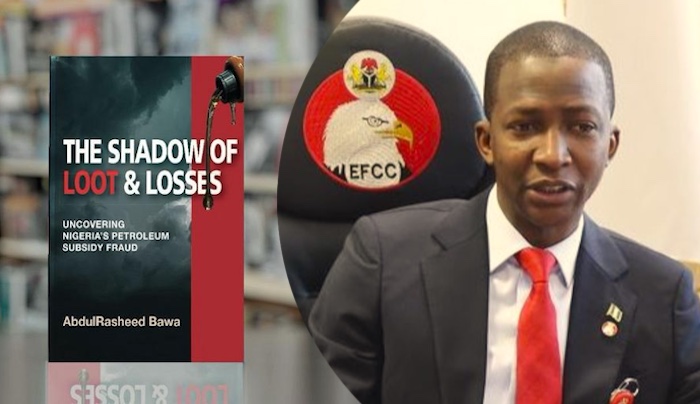Abdulrasheed Bawa, the former head of Nigeria’s Economic and Financial Crimes Commission (EFCC), has released a revealing book that explores one of the country’s largest financial scandals — the fuel subsidy fraud.
Titled “The Shadow of Loot & Losses: Unmasking Nigeria’s Subsidy Scam”, the book provides an in-depth look at the billions of naira lost through fraudulent subsidy claims over the years. Bawa, who played a direct role in investigating the infamous 2012 subsidy scandal, shares insider details on how the scheme was carried out and sustained.
The exposé pulls back the curtain on how public funds were drained through false claims, forged documents, and coordinated efforts between corrupt officials and private companies. Bawa recounts how investigative efforts led to the recovery of large sums and the prosecution of some key perpetrators, though he also highlights the deeper systemic problems that allowed the fraud to thrive.
Among the deceptive tactics outlined in the book are:
-
Fake importation and inflated claims: Some companies billed the government for fuel that was never delivered or inflated shipment volumes to collect excessive payments.
-
Document tampering: Shipping papers were doctored to exploit price differences in global oil markets, resulting in inflated subsidy claims.
-
Recycled claims: Single fuel consignments were often used to secure multiple payments through duplicate submissions.
-
Illegal diversion: Subsidised fuel meant for local use was often rerouted to black markets or smuggled to neighboring countries for profit.
Bawa argues that these corrupt practices were enabled by regulatory lapses, falsified records, and deep-rooted collusion between officials and business players. He describes the fraud as both a technical and moral failure in the management of Nigeria’s oil sector.
More than just an account of past events, Bawa presents the book as a wake-up call. He stresses the urgent need for reform, transparency, and accountability in the way Nigeria handles public funds — especially in the petroleum industry.
Drawing from his tenure as EFCC chairman from 2021 to 2023, Bawa combines factual analysis with personal insight, offering a rare perspective into the internal struggles of fighting corruption in a system plagued by political interference.
This book stands as a crucial resource for those who want to understand the extent of corruption in Nigeria’s oil sector and the ongoing battle to reform it.

